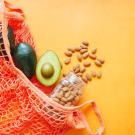Quick Navigation: Dietary Patterns | Heart and Brain Health | Physical Activity | Wellness
Dietary Patterns

Water- What's the Big Deal?
Water makes up about 60% of the human body! Read more to learn the many ways water supports our bodily functions and explore methods to improving your water intake.

Carbohydrates
Carbohydrates are a macronutrient which provide energy needed to complete daily activities and contribute important nutrients like vitamins, minerals, and fiber. Learn how to use a food label to help you plan your carbohydrate intake at meals and snacks.

The Glycemic Index
The glycemic index is a numerical value assigned to foods based on their carbohydrate load. Learn more about the glycemic index of common foods and how to apply it to your dietary pattern.

What causes Type 2 Diabetes?
Diabetes is a chronic disease that happens when the blood glucose (blood sugar) in a human’s body is consistently too high. Blood glucose comes from the foods we eat, and it is essential because it is the main source of energy for the body.

Added Sugar
Sugar is heavily ingrained in our food system today, and most Americans are eating way more sugar than is recommended. How do you differentiate between added sugar and naturally occurring sugar, and what is the recommended upper limit?

Fructose vs. Sucrose
You may have heard the common argument that fructose is the primary driver of all cardiometabolic disease. Does the scientific evidence support this hypothesis?

Artificial Sweeteners and Other Sugar Substitutes
Artificial sweeteners are synthetic sugar substitutes that are up to several thousand times sweeter than sugar. Learn more about the different types of artificial sweeteners and other sugar substitutes.

Plant-Based Milks
With rates of cow’s milk consumption in the U.S. plummeting, the variety of dairy alternatives on the market are rapidly expanding. Learn about the differences between these plant-based milks here.

Tofu: A Great Plant Protein
Tofu, or bean curd, is a nutrient-dense food that is made from coagulating soy milk. Learn about the different types of tofu and the different ways to enjoy this protein-packed protein alternative.

Eggs and Cholesterol
What is the truth? Learn about the topic of cholesterol in eggs and whether they can be included into a nutritious diet.

Dietary Fat
Fat is an energy-packed macronutrient. There are several different types of fat that may have different health implications, including saturated, monounsaturated, and polyunsaturated fats.

Sources of Calcium for Vegans
It is important to have enough calcium in the diet. The most common sources of dietary calcium are dairy products like milk, cheese, and yogurt. However, there are other plant-based sources of calcium that can be included in the diet of those following a vegan dietary pattern.

Prebiotics and Probiotics
Prebiotics and probiotics work in different ways to improve your gut health. What is the difference between the two, and why should we be consuming them?
Heart and Brain Health

Improving Blood Cholesterol
It is important to manage your blood cholesterol levels, as this has significant implications on your heart health. Here are some risk factors for having high cholesterol along with dietary changes to improve your cholesterol.

The MIND Diet
The Mediterranean-DASH Intervention for Neurodegenerative Delay (MIND diet) is a combination of the traditional Mediterranean and DASH (Dietary Approaches to Stop Hypertension) dietary patterns. What does the research say about this diet?

Heart Attack Fact Sheet
Learn more about the signs and symptoms of a Heart Attack to take control of your health and prevent a potential episode.

Stroke Fact Sheet
There are various factors that influence the risk for stroke. Read more to understand stroke types, symptoms and prevention.

Food and Mood
A balanced diet provides numerous benefits for our general health, but did you know there also might be a connection between food and our mental health? Here are some foods you can incorporate to support your mood.
Physical Activity

Physical Activity: Some Is Better Than None
Many daily activities can be counted towards the aerobic activity guideline of 150-300 minutes per week. Read on for the benefits of exercise and examples of physical activity that you can incorporate into your schedule.

Heart Healthy Exercise
Engaging in aerobic exercise, also called cardiovascular or endurance exercise, trains our heart, vascular system, and body to be more efficient. Read on to learn why this happens and what intensity of exercise constitutes cardiovascular training.

Resistance Training
Resistance training is any movement that causes the muscles to contract against external resistance. Here are some tips to training your different muscle groups and the benefits of resistance training.

Weight Loss Plateaus
When your progress in your health journey stalls, it may be due to a shift in your metabolism. How can you overcome this plateau, and who can you reach out to for help?
Wellness

Problem-Solving
Whether you're solving an issue at work or want to take steps to improve your health, here is a tried-and-true, step-by-step guide to approaching any problem you might have.